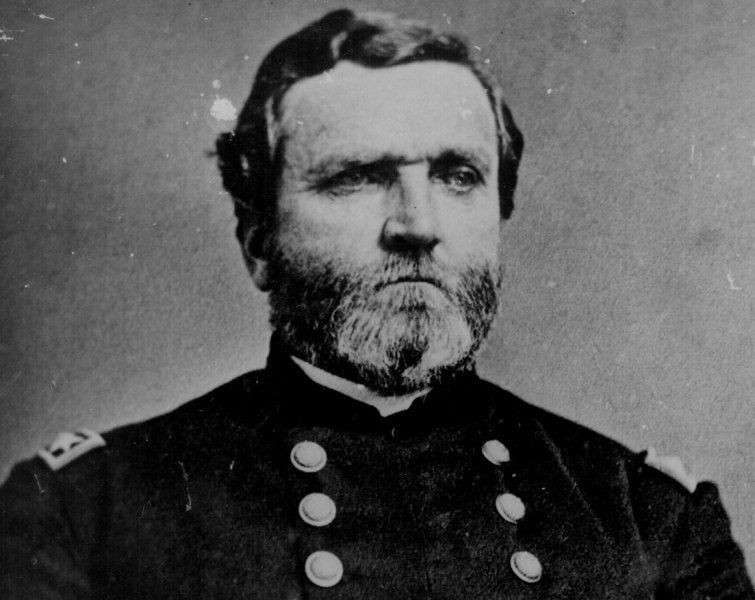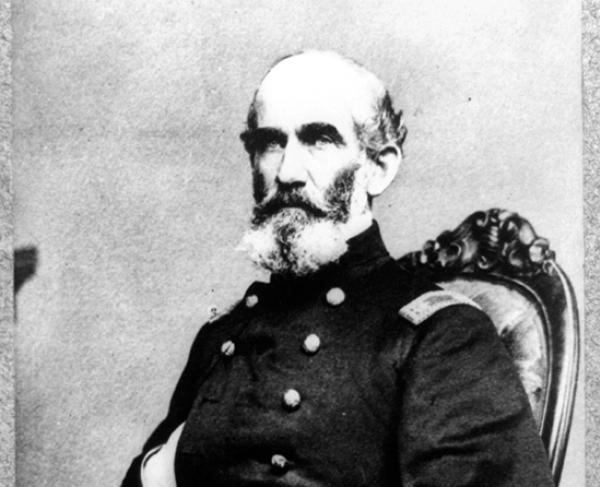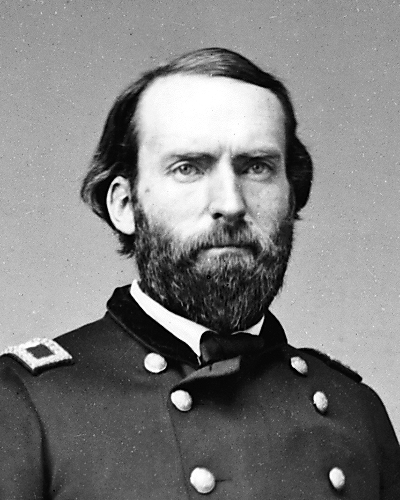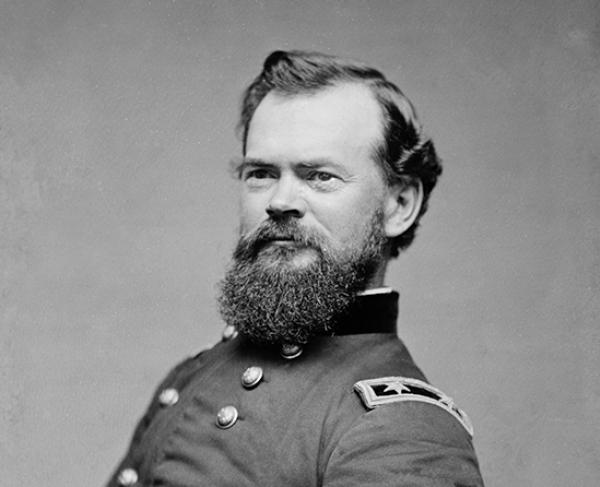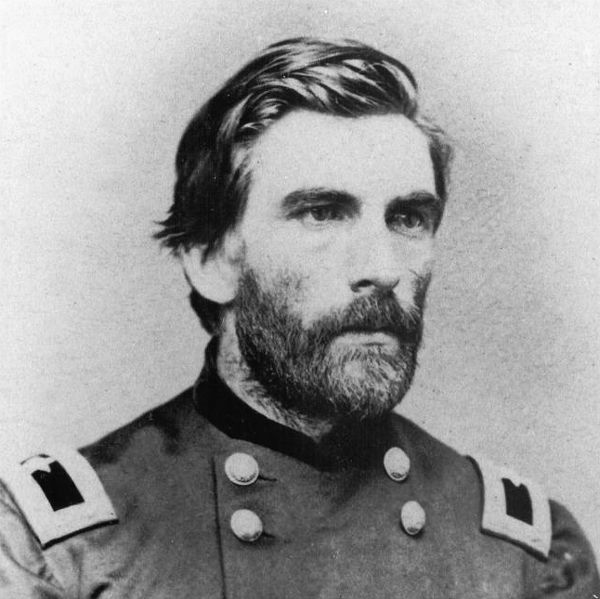While reading about Napoleon's Marshals, I came across an interesting statement. The author said that while not all of them were brilliant, none were terribly incompetent either. Not knowing that much about the Napoleonic Wars yet, I do not have the knowledge to affirm or deny this claim, but I started thinking about this in comparison to something I do know, the American Civil War. I wondered how well this statement could apply to the Union army corps commanders, roughly the equivalent of a Napoleonic Marshal. Realizing that the Civil War produced many generals who would technically fit the definition of corps commanders, I decided to apply some rules to make the number smaller.
Distinguished:
1. Winfield S. Hancock: IMHO, Hancock is unquestionably the Army of the Potomac's top tier corps commander, and would certainly be in or near the top five Union corps commanders of the war. Hancock combined a tactical genius with extreme bravery to form a brilliant reputation. While certainly not the perfect soldier he is sometimes depicted as, Hancock was a soldier's soldier if there ever was one. Combining his natural talent with one of the Army of the Potomac's best fighting forces, the II Corps, and it is hardly surprising that he is in this position.
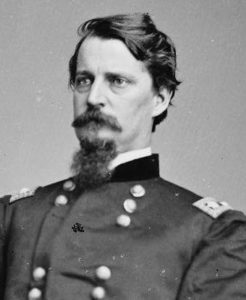
Capable:
2. Joseph Hooker: Although he would manage to effectively besmirch himself with his time as army commander, Hooker's service as a corps commander was surprisingly good. Aggressive possibly to a fault, Stephen Sears might have put it best when he said that Hooker was a general that marched to his own drum. While not possessing Hancock's tactical mind, Hooker seemed the second incarnation of Phil Kearny with all his bravery, dash, and bravado, although he was slightly easier to reign in than the one-armed New Jersey general. He provided a refreshing breath of aggression in a time when the Army of the Potomac was much deprived of that resource.

3. Henry W. Slocum: While not a man to keep his opinions to himself, especially the negative ones, Slocum was a hard fighter. When push came to shove, he and his criminally underrated command, the XII Corps, put their nose to the grindstone, as demonstrated at Chancellorsville in stopping Jackson's flank attack. Unlike some commanders, he performed well regardless if he liked or disliked his commander. Off the field, he could be merciless and conniving to a perceived inferior, although he did not do this in pursuit of a command like Hooker.
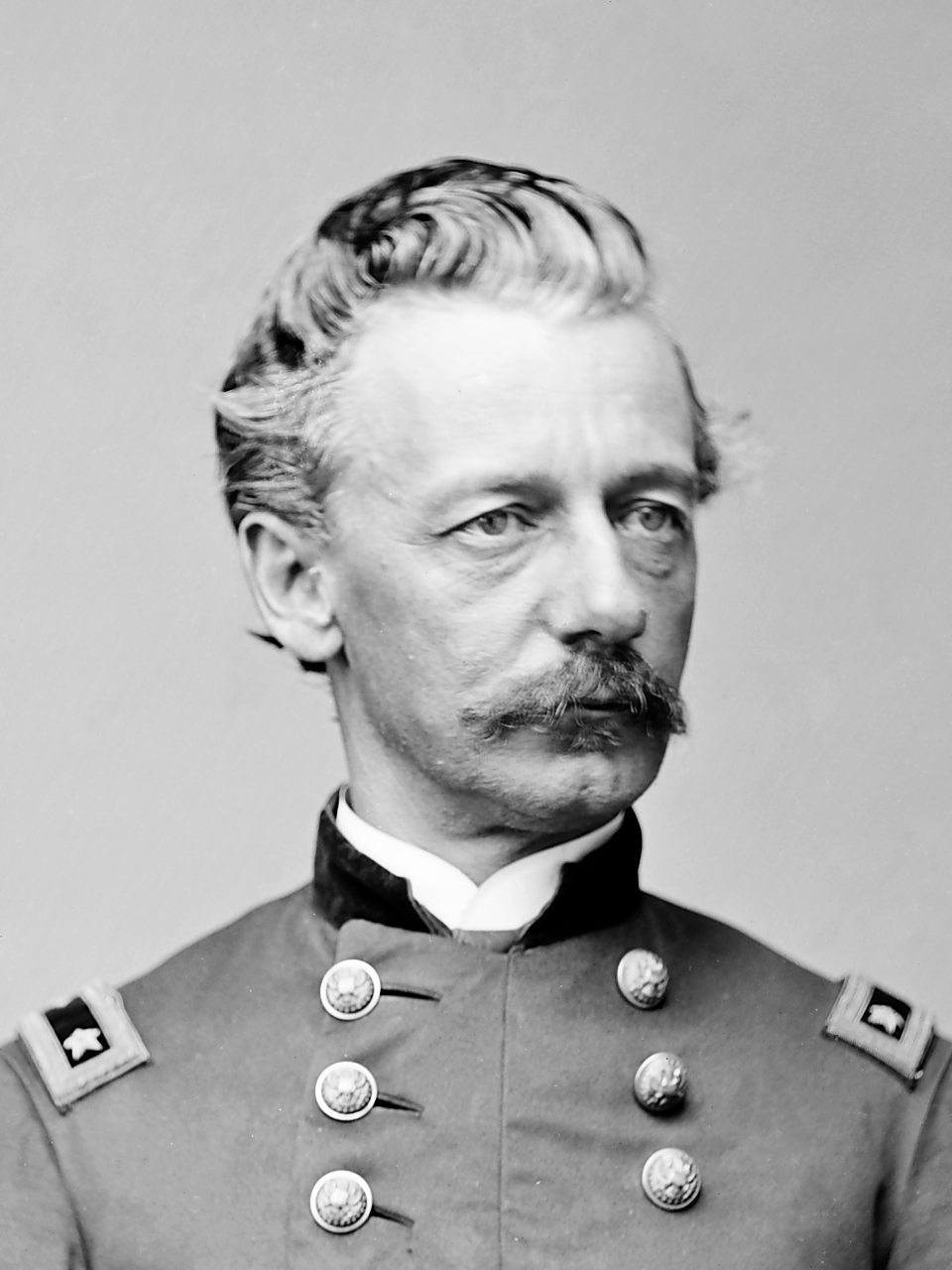
4. John F. Reynolds: Reynolds was always a corps commander on the brink of brilliancy. At Fredericksburg, his first major battle as a corps commander, one of his divisions under Meade managed to break through the CSA line, and despite, or perhaps as a result of accompanying Meade and his division, what could have been a brilliant opportunity was lost, although it could be argued William B. Franklin should be held responsible for this. Later at Chancellorsville, he was moving his I Corps to guard the right flank, but arrived too late to prevent Jackson's assault. At his final battle at Gettysburg, he began movements that could have possibly swept Heth from the field if executed properly, but was fatally struck down. Despite never achieving the glory of a brilliant maneuver, Renyolds was nevertheless a very dependable officer.

5. Jesse L. Reno: I debated myself back and forth about including Reno in the list of men, and later where to position him. Reno was personally a brave officer, beloved by his troops and colleagues, and had much potential for the future. Unfortunately, he would die similar to Reynolds, as both men went down while serving the role of a colonel or brigade commander, rather than a corps commander. I'll give Reno the benefit of the doubt and place him here on the ranking.

Competent:
6. John Sedgwick: Beloved by his VI Corps boys, and trusted and liked by his superior officers, Sedgwick was all around a competent corps commander. In fact, he personified this better than many others, never achieving the heights of brilliancy or the depths of stupendous failure. Sedgwick was just a veteran officer who could be relied upon to perform a maneuver that a lesser officer might have otherwise mishandled or botched. Sedgwick was just a comforting presence to be around, and an officer that could be trusted in most situations.
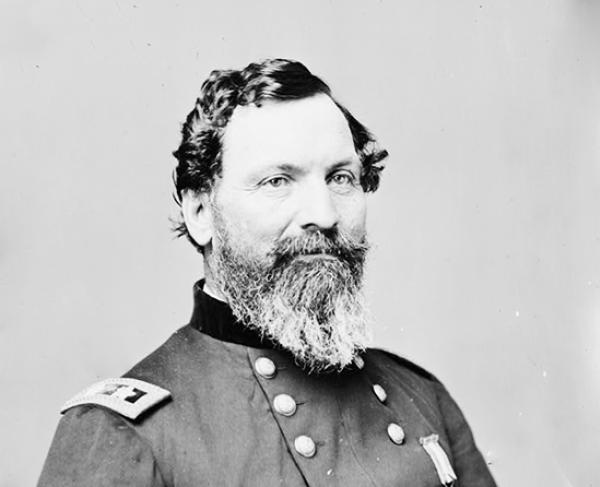
7. Horatio Wright: Made in a similar mold to his VI Corps predecessor, Wright was not brilliant at tactics, although he was slightly better at them then Sedgwick. When under a capable officer, Wright could perform well, although in independent command he would serve less so. The reason that Wright is below Sedgwick is simply because he never managed to gain the devotion from his fellow officers and soldiers that Sedgwick gathered throughout his career.
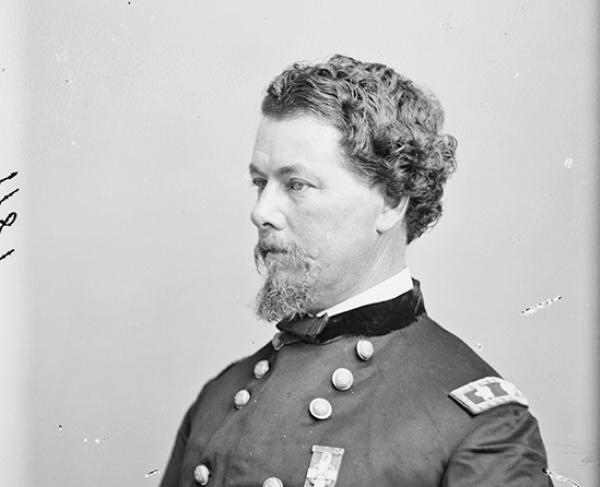
8. Gouverneur K. Warren: Receiving command of a corps following distinguished service as a staff officer at Gettysburg, Warren probably would have benefitted from more time spent with the infantry before assuming such a high command. He had a knack for getting himself on the wrong side of his superiors, which would ultimately cost him his command. Despite this, Warren was a strategic officer, who often demonstrated his ability to apply common sense to a situation and preferred thinking things out before entering action. When he did enter the battle, however, he usually was able to serve in a competent, if not distinguished, manner.
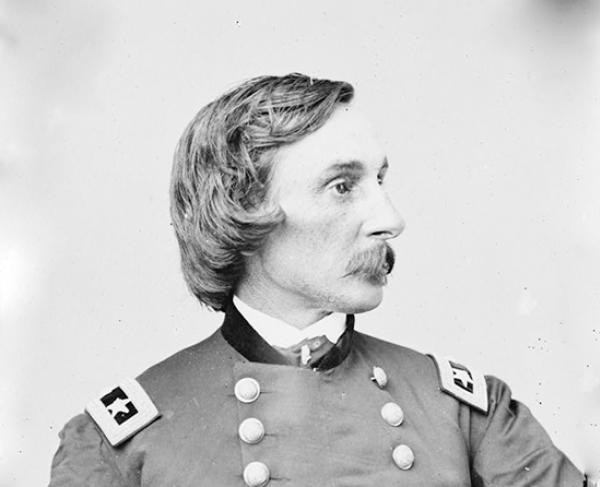
9. Fitz J. Porter: A man who effectively attached his career to that of McClellan, it probably would have gone better for him if he let his own talent get him his promotions. While not an aggressive officer, Porter could hold a line. He also was much more humble than many of his fellow officers. If not for Pope’s smear campaign following Second Bull Run, and if he had not made himself almost synonymous with McClellan, then he might have reached higher levels of command, or at least stayed in the Army of the Potomac longer.
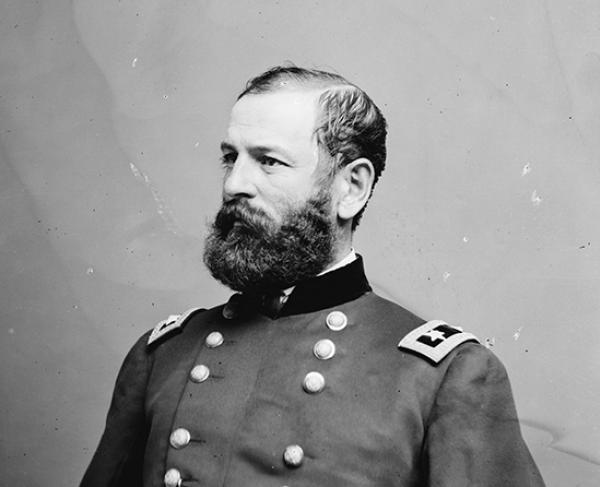
10. George Sykes: Sykes seems to be made in a similar mold to Porter, sans the intense loyalty to McClellan. While not gifted with the ability to effectively perform the complex requirements of offensive actions, Sykes was a man he could be trusted to hold the line in most situations, although history did not see how he would fare in more difficult circumstances due to his relief from command prior to the Overland Campaign.
:max_bytes(150000):strip_icc()/george-sykes-large-56a61b423df78cf7728b5e91.jpg)
11. Darius N. Couch: Couch has come to define what an average corps commander was in my opinion. During his time as commander, he would perform no amazing feats of military ingenuity, nor would have a dark stain on his legacy. Despite not being a bad commander, it was undoubtedly for the best of the II Corps that Hancock took the command from Couch, who was beginning to feel indifferent to his command, which likely would have resulted in decreased performance.
/darius-couch-1-5680aca83df78ccc15a76bcc.jpg)
12. Edwin V. Sumner: Due to his terrible showing at Antietam, in which he launched disorganized attacks that resulted in many more casualties than there should have been, I was tempted to put Sumner in the subpar category. Due to his heroics in the Seven Days Campaign, where he was able to guard the Army of the Potomac’s retreat and successfully extricate his command, I decided I would place him in the competent category, if just barely. It seemed that as the war wore on, Sumner began to wear out, and showed it in his ability to command.
:max_bytes(150000):strip_icc()/edwin-sumner-large-57c4b7715f9b5855e5f34bdf.png)
Subpar:
13. Daniel E. Sickles: While he brought aggression to an army in desperate need of it, he also showed a lack of a military understanding, and possessed immense arrogance. In no place does he better show this than his conduct at Gettysburg, in which he ignored orders and advanced beyond the rest of the Union line. He also demonstrated this trait at Chancellorsville when he pulled back from an amazing artillery position, and allowed Stuart and Lee to reunite their forces, although this was at the order of Hooker.
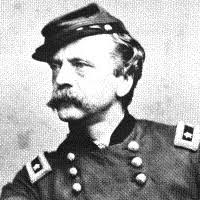
14. Samuel P. Heintzelman: A man who received his command due to his rank in the antebellum army, Heintzelman brought really nothing to the table. Combine this with an imcomptenent tactical mind like McClellan, and you have a recipe for an undistinguished military career. Shifting him to command the defenses of Washington was a respectful end to a long serving veteran who really had no place in commanding a corps.

15. Erasmus D. Keyes: Keyes fits into the same category as Heintzelman, a long-serving veteran of senior rank in the antebellum given a high command in acknowledgment of this. He similarly served in an undistinguished manner. The reason he ranks below Heintzelman is for the role in John A. Dix’s botched campaign to threaten Richmond during the Gettysburg Campaign.
 Incompetent:
Incompetent:
16. Irvin McDowell: For the sake of the nation and his career, it probably would have been best if McDowell stayed as a staff officer. He seemed unable to comprehend combat on a large scale, leading to embarrassing results. Between being flummoxed by Jackson in the valley, and the role he played in the disaster at Second Bull Run, McDowell fits well into this category.
:max_bytes(150000):strip_icc()/irvin-mcdowell-large-56a61b3e5f9b58b7d0dff158.jpg)
17. Ambrose E. Burnside: Another corps commander who I debated in which category to place, I have decided to place him in incompetent. At the Battle of South Mountain, he managed to get stymied for some time by an inferior number of Confederates, although he would inflict heavy casualties on D.H. Hill’s division, which would come back to haunt him at the Sunken Road. At the Battle of Antietam, he lended his name to the notorious Burnside’s Bridge, another example of a useless profusion of life due to command incompetence. Blame for this could be at least partially shared with McClellan for delaying the order to advance for too long. If Burnside had left his service as an Army of the Potomac corps commander here, I would have put him in subpar. But with his return in 1864, he manages to ruin his reputation even more. While he did manage get himself lost in the Wilderness, and turned in only average service at Spotsylvania and Cold Harbor, the real nail in Burnside's coffin would be the Crater. Although blame for the failure can be shifted at least partially to Meade, and an even lesser degree to Grant, Burnside's hands off approach cost the Union a brilliant opportunity to shorten the war, which, combined with everything else, lands him in the incompetent category.
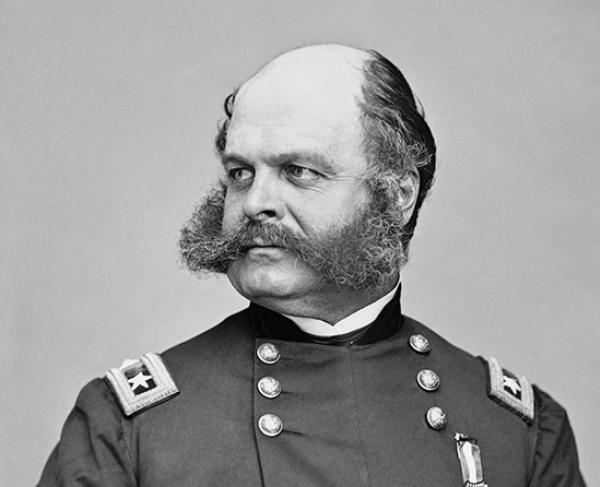
18. William B. Franklin: Franklin in the epitome of everything wrong with the Army of the Potomac. He seemed to be a gathering of some of the worst traits of other corps commanders. He had Hooker’s knack for scheming, Slocum’s tendency to complain, Porter’s unswerving loyalty to McClellan, and Burnside’s lack of imagination. If it were not for McClellan, he likely would have been swept out earlier. In no place was his lack of military skill put on greater display than Fredericksburg, where he performed the bare minimum that his orders required him to do, and after the defeat started scheming against his commander. He was the last of the officers truly dedicated to McClellan in the army, and with his dismissal brought an end to an era.
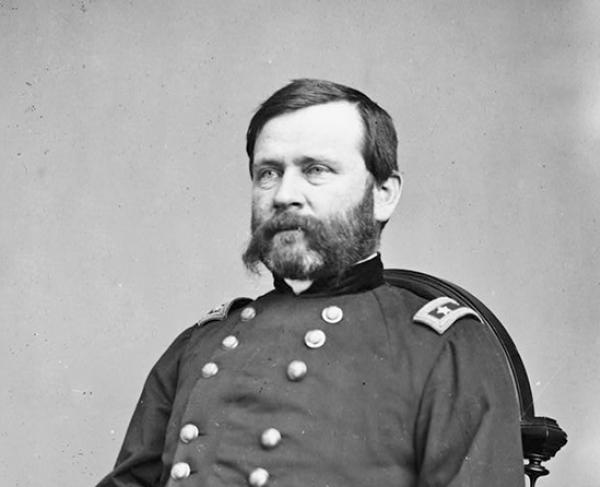
19. Oliver O. Howard: As much as it hurts to have any officer ranked below Franklin, Howard earns this terrible distinction. If his time as a division commander was included, or his service in the West, then he would be much higher, but following the rules I set out, I believe it would be wrong to place him anywhere but here. His time as a corps commander was marked by three things. First was the hatred of the troops under him felt. Second was the humiliation of have his flank turn to shreds by Jackson’s assault, which likely could have been avoided or made much less worse if he had followed orders. Third was a repeat of Chancellorsville at Gettysburg, with his corps again taking flight, and him subsequently blaming the rout of Abner Doubleday, which cost a good officer his command.
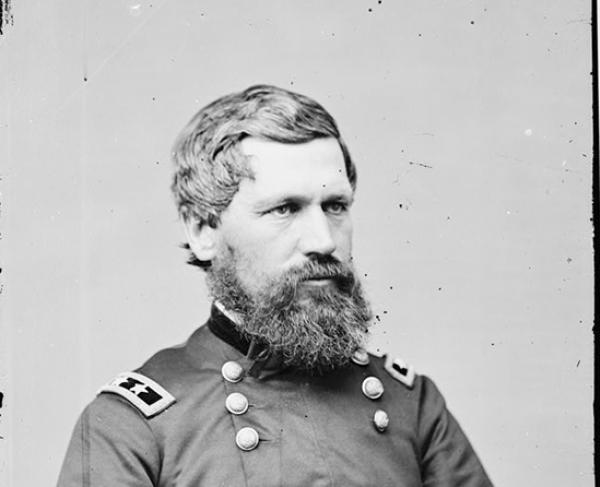
- They have to be Union infantry commanders from the Eastern Theater. (if this idea is popular, I'll probably make a separate thread for those excluded by this rule)
- They need to have served as a corps commander long enough for an accurate judgment to be made, so this list will not include men like George Meade, Dan Butterfield, George Stoneman, Jacob Cox, Charles Griffin, Andrew Humphreys etc. (This rule is pretty subjective, and there is definite space to argue who should be included or not)
- They will only be considered for their time as an Eastern Theater corps commander. This will help some (Hooker, Burnside) and hurt others (Howard)
- The generals will be placed into one of five categories: Distinguished, Capable, Competent, Subpar, and Incompetent
Distinguished:
1. Winfield S. Hancock: IMHO, Hancock is unquestionably the Army of the Potomac's top tier corps commander, and would certainly be in or near the top five Union corps commanders of the war. Hancock combined a tactical genius with extreme bravery to form a brilliant reputation. While certainly not the perfect soldier he is sometimes depicted as, Hancock was a soldier's soldier if there ever was one. Combining his natural talent with one of the Army of the Potomac's best fighting forces, the II Corps, and it is hardly surprising that he is in this position.

Capable:
2. Joseph Hooker: Although he would manage to effectively besmirch himself with his time as army commander, Hooker's service as a corps commander was surprisingly good. Aggressive possibly to a fault, Stephen Sears might have put it best when he said that Hooker was a general that marched to his own drum. While not possessing Hancock's tactical mind, Hooker seemed the second incarnation of Phil Kearny with all his bravery, dash, and bravado, although he was slightly easier to reign in than the one-armed New Jersey general. He provided a refreshing breath of aggression in a time when the Army of the Potomac was much deprived of that resource.
3. Henry W. Slocum: While not a man to keep his opinions to himself, especially the negative ones, Slocum was a hard fighter. When push came to shove, he and his criminally underrated command, the XII Corps, put their nose to the grindstone, as demonstrated at Chancellorsville in stopping Jackson's flank attack. Unlike some commanders, he performed well regardless if he liked or disliked his commander. Off the field, he could be merciless and conniving to a perceived inferior, although he did not do this in pursuit of a command like Hooker.

4. John F. Reynolds: Reynolds was always a corps commander on the brink of brilliancy. At Fredericksburg, his first major battle as a corps commander, one of his divisions under Meade managed to break through the CSA line, and despite, or perhaps as a result of accompanying Meade and his division, what could have been a brilliant opportunity was lost, although it could be argued William B. Franklin should be held responsible for this. Later at Chancellorsville, he was moving his I Corps to guard the right flank, but arrived too late to prevent Jackson's assault. At his final battle at Gettysburg, he began movements that could have possibly swept Heth from the field if executed properly, but was fatally struck down. Despite never achieving the glory of a brilliant maneuver, Renyolds was nevertheless a very dependable officer.

5. Jesse L. Reno: I debated myself back and forth about including Reno in the list of men, and later where to position him. Reno was personally a brave officer, beloved by his troops and colleagues, and had much potential for the future. Unfortunately, he would die similar to Reynolds, as both men went down while serving the role of a colonel or brigade commander, rather than a corps commander. I'll give Reno the benefit of the doubt and place him here on the ranking.

Competent:
6. John Sedgwick: Beloved by his VI Corps boys, and trusted and liked by his superior officers, Sedgwick was all around a competent corps commander. In fact, he personified this better than many others, never achieving the heights of brilliancy or the depths of stupendous failure. Sedgwick was just a veteran officer who could be relied upon to perform a maneuver that a lesser officer might have otherwise mishandled or botched. Sedgwick was just a comforting presence to be around, and an officer that could be trusted in most situations.

7. Horatio Wright: Made in a similar mold to his VI Corps predecessor, Wright was not brilliant at tactics, although he was slightly better at them then Sedgwick. When under a capable officer, Wright could perform well, although in independent command he would serve less so. The reason that Wright is below Sedgwick is simply because he never managed to gain the devotion from his fellow officers and soldiers that Sedgwick gathered throughout his career.

8. Gouverneur K. Warren: Receiving command of a corps following distinguished service as a staff officer at Gettysburg, Warren probably would have benefitted from more time spent with the infantry before assuming such a high command. He had a knack for getting himself on the wrong side of his superiors, which would ultimately cost him his command. Despite this, Warren was a strategic officer, who often demonstrated his ability to apply common sense to a situation and preferred thinking things out before entering action. When he did enter the battle, however, he usually was able to serve in a competent, if not distinguished, manner.

9. Fitz J. Porter: A man who effectively attached his career to that of McClellan, it probably would have gone better for him if he let his own talent get him his promotions. While not an aggressive officer, Porter could hold a line. He also was much more humble than many of his fellow officers. If not for Pope’s smear campaign following Second Bull Run, and if he had not made himself almost synonymous with McClellan, then he might have reached higher levels of command, or at least stayed in the Army of the Potomac longer.

10. George Sykes: Sykes seems to be made in a similar mold to Porter, sans the intense loyalty to McClellan. While not gifted with the ability to effectively perform the complex requirements of offensive actions, Sykes was a man he could be trusted to hold the line in most situations, although history did not see how he would fare in more difficult circumstances due to his relief from command prior to the Overland Campaign.
:max_bytes(150000):strip_icc()/george-sykes-large-56a61b423df78cf7728b5e91.jpg)
11. Darius N. Couch: Couch has come to define what an average corps commander was in my opinion. During his time as commander, he would perform no amazing feats of military ingenuity, nor would have a dark stain on his legacy. Despite not being a bad commander, it was undoubtedly for the best of the II Corps that Hancock took the command from Couch, who was beginning to feel indifferent to his command, which likely would have resulted in decreased performance.
/darius-couch-1-5680aca83df78ccc15a76bcc.jpg)
12. Edwin V. Sumner: Due to his terrible showing at Antietam, in which he launched disorganized attacks that resulted in many more casualties than there should have been, I was tempted to put Sumner in the subpar category. Due to his heroics in the Seven Days Campaign, where he was able to guard the Army of the Potomac’s retreat and successfully extricate his command, I decided I would place him in the competent category, if just barely. It seemed that as the war wore on, Sumner began to wear out, and showed it in his ability to command.
:max_bytes(150000):strip_icc()/edwin-sumner-large-57c4b7715f9b5855e5f34bdf.png)
Subpar:
13. Daniel E. Sickles: While he brought aggression to an army in desperate need of it, he also showed a lack of a military understanding, and possessed immense arrogance. In no place does he better show this than his conduct at Gettysburg, in which he ignored orders and advanced beyond the rest of the Union line. He also demonstrated this trait at Chancellorsville when he pulled back from an amazing artillery position, and allowed Stuart and Lee to reunite their forces, although this was at the order of Hooker.
14. Samuel P. Heintzelman: A man who received his command due to his rank in the antebellum army, Heintzelman brought really nothing to the table. Combine this with an imcomptenent tactical mind like McClellan, and you have a recipe for an undistinguished military career. Shifting him to command the defenses of Washington was a respectful end to a long serving veteran who really had no place in commanding a corps.

15. Erasmus D. Keyes: Keyes fits into the same category as Heintzelman, a long-serving veteran of senior rank in the antebellum given a high command in acknowledgment of this. He similarly served in an undistinguished manner. The reason he ranks below Heintzelman is for the role in John A. Dix’s botched campaign to threaten Richmond during the Gettysburg Campaign.

16. Irvin McDowell: For the sake of the nation and his career, it probably would have been best if McDowell stayed as a staff officer. He seemed unable to comprehend combat on a large scale, leading to embarrassing results. Between being flummoxed by Jackson in the valley, and the role he played in the disaster at Second Bull Run, McDowell fits well into this category.
:max_bytes(150000):strip_icc()/irvin-mcdowell-large-56a61b3e5f9b58b7d0dff158.jpg)
17. Ambrose E. Burnside: Another corps commander who I debated in which category to place, I have decided to place him in incompetent. At the Battle of South Mountain, he managed to get stymied for some time by an inferior number of Confederates, although he would inflict heavy casualties on D.H. Hill’s division, which would come back to haunt him at the Sunken Road. At the Battle of Antietam, he lended his name to the notorious Burnside’s Bridge, another example of a useless profusion of life due to command incompetence. Blame for this could be at least partially shared with McClellan for delaying the order to advance for too long. If Burnside had left his service as an Army of the Potomac corps commander here, I would have put him in subpar. But with his return in 1864, he manages to ruin his reputation even more. While he did manage get himself lost in the Wilderness, and turned in only average service at Spotsylvania and Cold Harbor, the real nail in Burnside's coffin would be the Crater. Although blame for the failure can be shifted at least partially to Meade, and an even lesser degree to Grant, Burnside's hands off approach cost the Union a brilliant opportunity to shorten the war, which, combined with everything else, lands him in the incompetent category.

18. William B. Franklin: Franklin in the epitome of everything wrong with the Army of the Potomac. He seemed to be a gathering of some of the worst traits of other corps commanders. He had Hooker’s knack for scheming, Slocum’s tendency to complain, Porter’s unswerving loyalty to McClellan, and Burnside’s lack of imagination. If it were not for McClellan, he likely would have been swept out earlier. In no place was his lack of military skill put on greater display than Fredericksburg, where he performed the bare minimum that his orders required him to do, and after the defeat started scheming against his commander. He was the last of the officers truly dedicated to McClellan in the army, and with his dismissal brought an end to an era.

19. Oliver O. Howard: As much as it hurts to have any officer ranked below Franklin, Howard earns this terrible distinction. If his time as a division commander was included, or his service in the West, then he would be much higher, but following the rules I set out, I believe it would be wrong to place him anywhere but here. His time as a corps commander was marked by three things. First was the hatred of the troops under him felt. Second was the humiliation of have his flank turn to shreds by Jackson’s assault, which likely could have been avoided or made much less worse if he had followed orders. Third was a repeat of Chancellorsville at Gettysburg, with his corps again taking flight, and him subsequently blaming the rout of Abner Doubleday, which cost a good officer his command.

Last edited:
